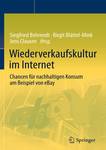Resale culture on the internet
Abstract
Electronic auction markets and trading platforms open up new scope, particularly with regard to sustainable consumption. The further development of internet-based used goods markets offers opportunities to tap into previously unutilised environmental relief potential. This potential is essentially based on the possibility of extending the life and utilisation phase of products by marketing used goods and thus avoiding the additional environmental impact of new purchases.
Until now, the exploitation of reuse opportunities in the private household sector has often failed due to high transaction costs, meaning that trade in used products has been limited to regional markets. Due to these obstacles, a critical size for used goods markets that could be attractive for both suppliers and buyers was often not reached either locally or regionally. However, the rapidly increasing use of the Internet and large trading platforms such as eBay have fundamentally changed the framework conditions in recent years.
The sustainability potential associated with e-commerce and the role shift from consumer to prosumer is being investigated in a current, transdisciplinary research project.1 The project, in cooperation with and using the example of eBay, is the first to comprehensively analyse the effects of online trading in used goods and identify starting points for tapping into sustainability potential. Following Alvin W. Toffler (1980), the term "prosuming" refers to the coupling of production and consumption.
In order to determine the sustainability effects of online-based second-hand trade, the following factors are important: knowledge of the existence of unused goods in the household; knowledge of the conditions under which private households increasingly engage in internet-based second-hand trade; knowledge of the ecological effects of online-based second-hand trade; identification of aspects of prosuming through online-based second-hand trade; and finally knowledge of the conditions of individual sustainability in the context of online-based second-hand trade.
